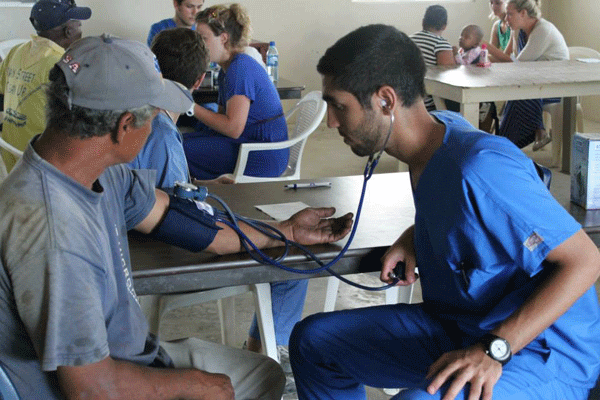Armin Mortazavi is a sophomore physics and biochemistry major who has already embarked on biophysics and membrane research at the University of Arkansas. A service learning trip to Belize last summer gave him some valuable lessons outside of the lab and classroom, opening his eyes to the importance of listening and a caring touch when meeting with patients. Here is an excerpt from one of Armin’s journal entries, written while he was in Belize.
May 22, 2013
…We went to the house of an old man who has been in a bed for eight years after a stroke and couldn’t talk. He has lain there for eight years. I couldn’t imagine going through that, not too mention that he was 91. The family keeps him clean but he never gets out of the bed to see the world or sunlight. His fingernails had fungus all over them and they hadn’t been well maintained. We tried to clean them and cut them but it was too painful for the man. He just wanted some attention and human contact, just somebody to be next to him and touch him. I learned from this trip that people need attention and the idea that somebody is caring for them. There was no need to take the blood pressure of the man with cancer who was surely to die within a couple of months, but we did it for his comfort. Which to me is the idea of palliative care, to give comfort to the patient.
The old man who had been in bed for eight years loved when people just held his hand. For some reason he took a real liking to me. I’m not sure why, but I think because I reminded him of his son. The man kept on moving his hand in my direction and wanted me to hold it and that just meant so much to him. I was happy to do something so simple. Two months previously, his wife, who had been taking care of him for eight years, died, and that really affected his well being, as it would anybody in the world. It was just so sad to me. The lady who was taking care of him told us and when she mentioned that, there were tears running down the man’s face. I wiped the tears with a napkin and he held my hands harder.
This old man lived 50 yards away from the Jungle Hut hotel [where Armin was staying] and I had no idea that he was sick and had gone through so much. I feel like it is important to realize that the world is such a big place with so many different people with different stories and paths, who have their own experiences, their own pains and struggles. It’s day one of real work and I’m already beginning to change my idea of the world.
Since this was the second year that the student health teams worked in Belize, I was not sure what to expect, since most projects are still pending and there are many roadblocks. However, I did have many goals for these projects. The main one was to make a positive impact in somebody’s life; if I did that, I would consider my efforts a success. I hoped to influence the community, or even just a few people, by informing them about diabetes and how they can better their health, or have a successful screening where we caught early symptoms of diabetes, heart disease, or vision problems. I can easily say that this goal was accomplished. I was a leader of the community health screenings, which involved checking BMI, blood pressure, blood sugar and eyesight, and educating anybody who decided to drop by about good nutrition. I was so fortunate to be a part of this project because I was able to accomplish my goal so easily and repeatedly. There were numerous times that people came in and had signs of diabetes and had no idea. We then referred them to doctors.
Another great thing about the trip is the amazing weekend excursions. One weekend we went to an island called Caye Caulker and went snorkeling with sharks and stingrays and just relaxed. The next weekend we went to a city called San Ignacio where a lot of us went to an old Mayan cave (bucket list worthy experiences). If you have the funding and opportunity to go on this trip, definitely go, because it really puts the world in perspective.
My family is originally from Iran. My father is from a rural town in Iran where some of the roads are made from dirt and there are random rocks lying in the street and people have to watch out so they don’t stub their toes on these rocks. There is this saying that circulates in Iran that my father shared with me. “If you are always looking down at the ground for rocks, you will never get a chance to look at the stars.” I’m hoping I can really get a chance to look at the stars.

